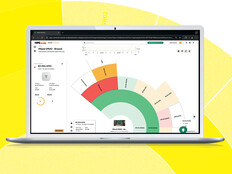Energy Startup Boss Controls Hopes to Get Pittsburgh to Adopt Smart Electrical Outlets
Boss Controls, a startup founded in 2012, has a simple pitch for Pittsburgh officials: Use our smart, connected electrical outlets and we’ll save the city a lot of money.
The Internet of Things company makes and sells a Wi-Fi–enabled smart electrical outlet that connects to an Internet portal on a PC or a mobile device. The outlet can be monitored and controlled remotely to turn off energy to outlets and appliances when they are less likely to be used — in city buildings, that’s usually nights and weekends.
Having conducted a pilot program with the city in June 2015, Boss Controls CEO Greg Puschnigg now plans to deliver a formal presentation this month to city officials, the Pittsburgh Post-Gazette reported.
“Our focus is connecting all electrical devices to the Internet, making them smart,” Puschnigg said. “There are huge energy savings that will come out of that.”
Making Old Electrical Outlets Smart
In energy parlance, “plug load” refers to the energy used by appliances that are connected to electrical wall outlets. According to the U.S. Department of Energy, plug loads account for 33 percent the electricity used by commercial buildings in the U.S. And according to the Energy Trust of Oregon, plug loads make up 15 to 25 percent of the electricity used in offices, on average.
Boss Controls is attacking this problem through its technology. The company charges $99 per Wi-Fi–connected smart wall outlet, according to the Post-Gazette, but then also installs the device, conducts an energy audit and provides baseline data on energy usage. More importantly, the device lets customers shut off power to whole floors of office buildings or just to individual appliances.
“It allows control over essentially all the electrical devices in the building that are energized by a wall outlet,” Boss COO Dan Brailer told the Post-Gazette. “We’re seeing very large companies with very large needs.”
From Pilot Project to the Next Stage
Boss Controls conducted a two-week trial with the City of Pittsburgh in June 2015 to test its outlets at a couple of city-owned buildings, thanks to a partnership with Carnegie Mellon University, according to StateScoop. Boss installed the test devices at no cost.
The pilot showed that soda vending machines and coffee pots sucked up the most energy. By managing the energy consumption of those devices, the city was able to save on energy costs, Boss said.
The Post-Gazette reported that Boss was able to generate energy savings exceeding 60 percent during the pilot project. The test was one element of the Global City Teams Challenge, and the outlets were put in several buildings, including U.S. Steel Tower and a few buildings at Carnegie Mellon.
Aftyn Giles, Pittsburgh’s sustainability coordinator, told StateScoop in June that the energy-consumption information the outlets provided was of “tremendous value” to the city. “The city can look at a 50 percent average in savings using plug load controls year over year,” Giles said. That is what Boss hopes Pittsburgh decides to do when the company presents its formal proposal to have the outlets installed in more than 300 buildings across the city, Puschnigg told the Post-Gazette.
Tim McNulty, spokesman for Pittsburgh Mayor Bill Peduto, did not immediately respond to a request for comment.









